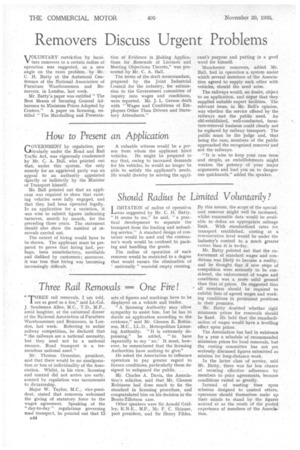Should Radius be Limited Voluntarily ?
Page 58

If you've noticed an error in this article please click here to report it so we can fix it.
LIMITATION of radius of operation was suggested by Mr. C. H. Batty. It seems to me," he said, " a prac. tical development to separate the transport from the loading and unloading service." A standard design of container would be used and the contractoi's work would be. confined to packing and handling the goods.
The radius of operation of each remover would be restricted to a degree that would ensure the elimination of nationally" wasteful empty running. By this means, the scope of the specialized remover might well be increased, whilst reasonable data would be available to define an appropriate mileage limit. With standardized rates for transport established, costing at a remunerative level would be under the industry's control to a much greater extent than it is to-day.
Mr. Batty pointed out that the enforcement of standard wages and conditions was likely to become a reality, and he thought, that if new steps of compulsion were seriously to be considered, the enforcement of wages andconditions was a more solid ground, than that of prices. He suggested thatall members should be required to exhibit lists of agreed wages and working conditions in prominent positions in their premises.
Mr. Batty doubted whether rigid minimum prices for removals should be fixed. He held that the standardization of wages would have a levelling effect upon prices.
The Association has had in existence for a year a schedule of recommended minimum prices for local removals, but the costing committee has not yet seriously discussed figures submitted as minima for long-distance work.
In the latter class of service, said Mr. Batty, there was far less chance of securing effective adherence by members to price agreements, because conditions varied so greatly.
Instead of wasting time upon schemes designed to control others, operators should themselves make up their minds to stand by the figures arrived at as the result of the pooled experience of members of the Association.




























































































